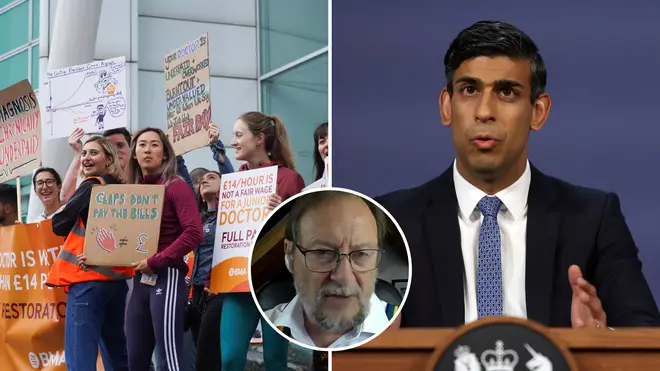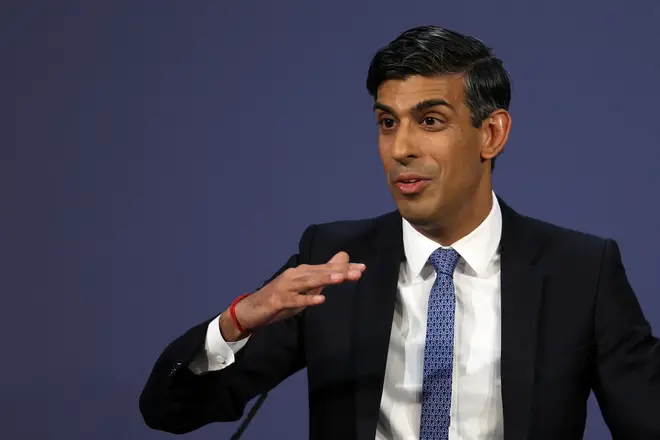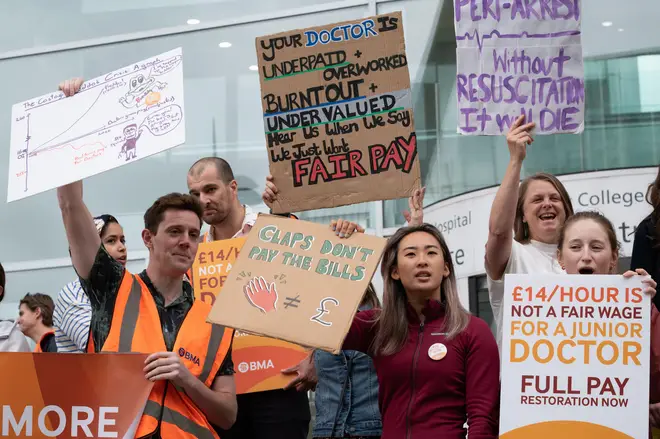
Clive Bull 1am - 4am
13 July 2023, 18:31 | Updated: 13 July 2023, 19:02

It's a "complete fallacy" to say there is not enough money to give junior doctors a higher pay rise than six per cent, the chairman of the British Medical Association (BMA) has told LBC.
The Prime Minister Rishi Sunak announced on Thursday that millions of UK public sector workers will get pay rises of 6% or more, including junior doctors.
Chairman of the BMA, professor Phil Banfield, has slammed the government's decision to cap the pay rise at six per cent, saying it is "disingenuous" to suggest the government cannot afford more.
"I’ve seen nothing today that changes (our) situation. This government has had plenty of opportunity to negotiate,” Mr Banfield told LBC’s Andrew Marr.
“This government has spent more than it would cost to settle these strikes on paying the private rail companies to not settle the rail disputes," he continued.
“We’ve had record profits from energy companies, so it is a complete fallacy that there is no money in the system. The staff on the NHS - nurses, doctors - deserve, fair pay.
"Unfortunately, the erosion of the pay of doctors is driving them away from the health service."
But Downing Street has hit back, with Mr Sunak's spokesperson telling reporters: "I don't think the Prime Minister could have been clearer today. There will be no more talks on pay."

Further doctor strike action likely according to BMA chair
Read more: How much is everyone going to get?
Meanwhile, the Prison Officers Association (POA) said it will "not back down" in the wake of pay rises offered by the Government.
National chairman of the union Mark Fairhurst said: "Those members who received between 7 and 10% will not be fooled by yet another below inflation award that will fail to convince them to stay in the service and will not improve their standard of living.
"Years of pay freezes and austerity now need to be addressed in future pay awards. We will now consider our options in relation to the failure to award a non-consolidated cost of living payment in line with other civil servants."
"We will do all in our power to address the concerns of our members. The POA will not back down," he added.

As well as junior doctors, teachers will be given a 6.5% rise and junior doctors will receive 6%.
Police and prison officers are expected to receive rises of 6% while armed forces personnel will receive 5-6%.
The Government's decision to rule out extra borrowing to fund the pay increases could leave departments forced to find £3 billion from existing budgets.
Ministers expect striking public sector workers to call off industrial action and go back to work in the coming days.
The pay announcement caused four teaching unions to push for strikes to be called off. The ASCL, NAHT, NASUWT, and NEW have been asked to put the new deal to members with a recommendation to accept the significant raise in pay.

“The deal will allow teachers and school leaders to call off strike action and resume normal relations with the government,” a joint statement from Rishi Sunak and the unions said.
Treasury minister John Glen said the Government is taking steps to "deliver sound money while providing a fair pay deal to public sector workers".
He told MPs: "Today I can announce that the Government has accepted the headline recommendations of the independent pay review bodies in full.
"We are doing this whilst abiding by sound money which, as the Chancellor said at Mansion House on Monday this week, is our number one focus."

Doctor: 6% pay offer is 'insulting'
Mr Glen added that the Government will do "everything we can to tackle inflation", telling MPs: "That means we must take responsible decisions on the public finances, including public sector pay because more borrowing is itself inflationary.
"According to recent IMF estimates, advanced economies which increased public expenditure by one percentage point - which would mean £25 billion for the UK - saw inflation rise by half a percentage point.
"Yet our decision is responsible because, unlike some unsustainable demands, we have delivered awards that don't further fuel inflation and make the inflationary environment worse.
"We said we would accept the outcome of the public pay review bodies and that is exactly what we will do, and we will do so because we are proud of our world-class public servants and owe them a debt of gratitude for their service through the last few years, including through the pandemic."
Earlier, Chancellor Jeremy Hunt said the Government would take "difficult but responsible" decisions on public sector pay.
He told MPs that "it is important to deliver on the Prime Minister's priority to get debt falling and to control borrowing to avoid adding inflationary pressures and risk prolonging higher inflation".
"That means taking difficult but responsible decisions on the public finances, including public sector pay, because more borrowing is itself inflationary," Mr Hunt said.